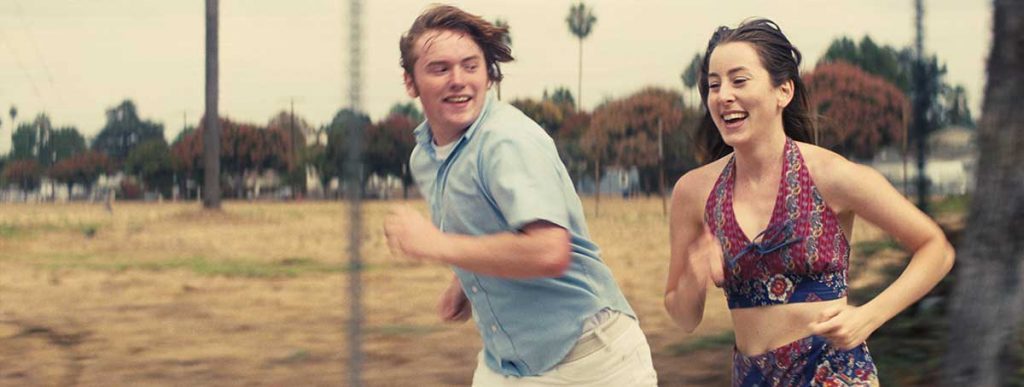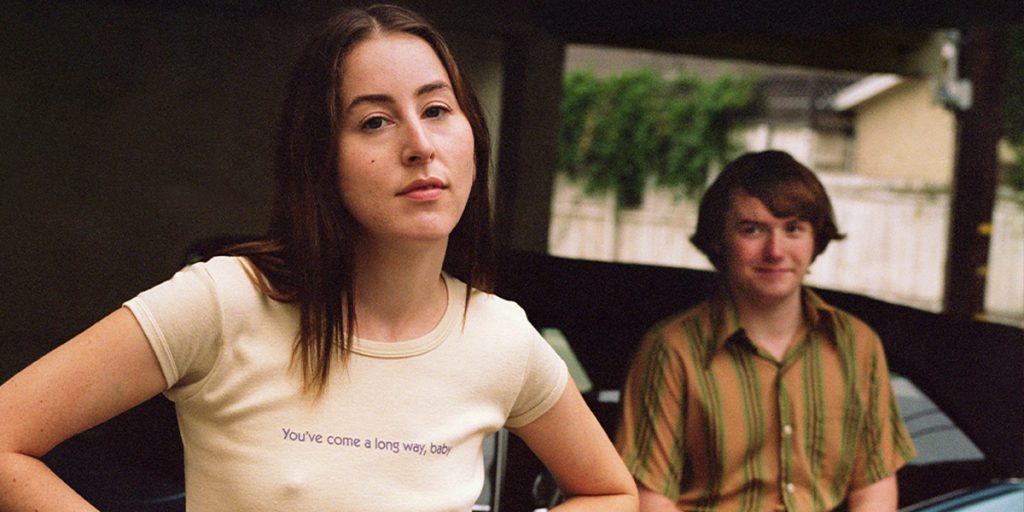Like taking a time machine back to the 1970s, Licorice Pizza is a delightful piece of cinema, one rich with detail, character and an undeniably charming playfulness.
If Phantom Thread (2017) was Paul Thomas Anderson daring to break out of the hazy, sun-kissed confines of California with his first London-set film, then Licorice Pizza is the masterful director returning to his gorgeous comfort zone. Anderson’s latest is everything you would expect from a man at the top of his game, one who is showing no signs of faltering. It not so much snuggles back into the warm cosiness of the San Fernando Valley, rather races back into it at full speed with a euphoric comedy perhaps not seen since Boogie Nights (1997). Licorice Pizza is not without its faults – the free-flowing nature of it perhaps inevitably gives it a narrative looseness – and yet they are never enough to diminish the film’s effect entirely. It is a romance film, yes, but as with all his other films, Anderson gives its central romance a warped, unconventional angle, marking Licorice Pizza out as more than just a simple rom-com.
Amongst the eclectic and hugely watchable ensemble cast of Licorice Pizza are the two main characters, Alana and Gary. The latter is played by Cooper Hoffman, the teenage son of the late Anderson favourite, Philip Seymour, in his feature film debut, and the former is put to screen by Alana Haim, one of the main members of rock group HAIM. Haim’s two sisters, mother and father also have small roles in the film. Licorice Pizza centres on their platonic relationship, with hints of romance injected at certain points, one that is complicated by Alana being 25 years old and Gary only being 15. Anderson handles this uncomfortable age difference well, for the most part – Alana admits to her sister that it is weird she hangs out with a group of 15-year-olds – as he hints at a close connection between the two but a recognition between them that it will remain platonic. A significant plot choice near the end though is uncomfortable, to say the least, and is a narrative misstep that is very rarely seen in Anderson’s films.
Licorice Pizza begins with a moving camera long take set to Nina Simone’s “July Tree” (one of many expert soundtrack choices), as Gary strikes up a conversation with Alana at his school as she works as a photographer’s assistant. This breathless, dreamy opening is as dynamic as you would expect; it sweeps you up from the get-go into this colourful, Californian world. Gary’s adultlike, charming personality is striking, with Hoffman giving an amusing maturity to this teenager. Alana agrees to meet him for dinner that evening – not a date, she is clear to add – perhaps out of intrigue more than anything. Haim, here starring in her first feature film too, gives a wonderful, attitude-heavy performance, imbuing her onscreen character with a teenage-like sulkiness and energy at odds with her true age. From here, the two strike up an unlikely but realistic relationship, with Gary’s work as an actor and entrepreneur taking these two misfits on a rollercoaster journey through 1970’s California. Whilst their relationship is the crux of Licorice Pizza, Anderson’s screenplay gives time to their surrounding environment too. He has always been so adept at crafting a setting on screen for stories to unfold, and Licorice Pizza is no different with its dreamy, romantic recreation of the San Fernando Valley. If films can be time machines, then this one most certainly is.

Perhaps more than anything, Licorice Pizza is a film rich in detail. Every aspect of it has warmth behind it, a thoughtful, slice-of-life freshness which very few directors and screenwriters (Anderson does both, as usual) can give their films. Michael Bauman, here acting as cinematographer on his first feature film alongside Anderson, adds a romantic, smoky haze to proceedings with imaginative use of lights and lens flares, giving Licorice Pizza’s setting a lived-in, undeniably 70’s feel. The screenplay is quick and fresh and frequently funny, again highlighting Anderson’s clear propensity for comedy, not just drama.
A repeated racist joke marks out another, more unforgivable misstep though, one which sees John Michael Higgins use a mocking accent toward a Japanese character. Anderson’s intention might not have been to offend, and he doesn’t glorify Higgins’ character or the joke, but it comes off as ugly and crass, to say the least. During Gary and Alana’s journey in Licorice Pizza, they meet other characters, with notable mentions needed for Bradley Cooper’s (A Star Is Born) insane cameo as real-life producer Jon Peters, and, perhaps most memorably, Harriet Sansom Harris (Phantom Thread) as Mary Grady, also a real-life Hollywood child talent agent. Harris’ quivering, explosive facial expressions, captured in glorious close-up, remain a thoroughly memorable moment from the rich tapestry that is Licorice Pizza.
As Licorice Pizza hurtles towards its conclusion at a relentless speed – there is a lot of running from the two main characters – it surprisingly runs out of steam, if only for a short while. Anderson has always been a master at creating complex but cohesive tapestries of characters, who might exist separately at times but generally interlink, and yet Licorice Pizza does not always have this strong connection. You never feel the length of Magnolia (1999) even with its plus 3-hour runtime, but Licorice Pizza does drag in its latter stages. It is, however, always watchable and for the most part hugely propulsive and full of that trademark Anderson dynamism, largely owed to his quirky use of long takes and moving camerawork. The rocking soundtrack has some of his best musical choices to date too and Jonny Greenwood’s original score, though infrequent, is still a resonant piece of work.
Licorice Pizza does not have the intense capitalist themes of There Will Be Blood (2007) nor does it have the religious grandeur of Magnolia, but what it does have is its own free-wheeling, childlike innocence. Gary and Alana have discoveries with and without each other, both different in age yet both sharing a simmering search for some sort of direction in life. It is Anderson at his most playful certainly, and perhaps his lightest film to date, a coming-of-age story largely unconcerned with the greater complexities of life. There is a cheerful playfulness to Licorice Pizza which will inevitably sweep you away from the very beginning. The bar is high for a director of Anderson’s ilk, which perhaps make the weaknesses of Licorice Pizza more glaring, but his latest film is further proof of his comfortability in both the comedic and dramatic realms, Californian setting or otherwise.
Licorice Pizza is now available to watch on digital and on demand.

